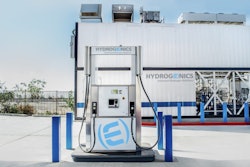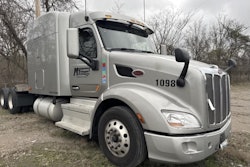This is the third part in a multi-part series exploring the costs and viability of fuel cell technology as an alternative to diesel-powered Class 8 trucks. See the rest of series at this link.
Hydrogen is an invisible, odorless gas that ranks as the lightest and most prolific element in the universe. It’s also highly flammable. But then again so are other transportation fuels with the exception of diesel, which has the highest flashpoint among conventional fuels.
Proponents of using hydrogen as a fuel to power Class 8 trucks say it’s a silver bullet in finding tech to meet ever-tightening emissions standards, since it’s clean, abundant, can mirror the fueling infrastructure of diesel and meet the tough demands of long-haul trucking with much less weight and fewer fueling stops than all-electric. Its detractors, however, say it’s inefficient when compared to battery-electric power and presents significant safety risks.
So far in the U.S., fuel cell transportation has largely been relegated to California, where nearly all of the nation’s hydrogen stations are located. From cars to trucks, the safety record is sound, said California Fuel Cell Partnership Technical Program Manager Nico Bouwkamp.
“It’s been good so far with regards to the integration and the safety record. And that’s also because hydrogen systems in the way they’re designed, they’re significantly over-designed for safety so the systems are a lot stronger than compared to a diesel truck,” he said.
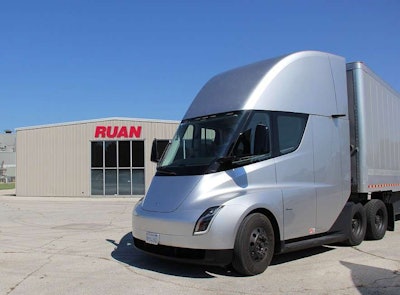 Tesla founder and CEO Elon Musk has repeatedly condemned fuel cells and instead embraces all-electric powertrains as the transportation technology of tomorrow.
Tesla founder and CEO Elon Musk has repeatedly condemned fuel cells and instead embraces all-electric powertrains as the transportation technology of tomorrow.In June following Nikola’s IPO, Musk called fuel cells “staggeringly dumb” in a Tweet that made plenty of news. His views haven’t changed through the years. In 2015, during an Automotive News press conference he summarized his disdain for the technology saying that hydrogen was a “pernicious molecule” that was “extremely flammable” and caused “metal embrittlement.” His chief complaint then still remains centered today on the inefficiency of the fuel cell industry when compared to battery-electric.
In its 2019 Advanced Truck Technologies report, the U.S. Department of Energy lists electric at a 95% drive efficiency compared to fuel cell at 59% and diesel at 46%. However, fuel cell proponents point out that freight-ton efficiency—the ability of a truck to haul as much freight as possible for as long as possible without refueling—is where electric currently falls flat in long-haul.
“You just can’t fill a battery,” Bouwkamp said. “Let’s say the Tesla truck or any truck that wants over a 500-mile range, you’re looking at least at a 1,000-kilowatt battery. That’s a lot of weight. That’s a lot of energy. And to charge it, if you want to do that in 15 minutes you’re going to need a 4-megawatt charger. That’s massive and I can only imagine what that looks like with regards to cable, or just the capacity required to get that energy to a truck.”
Bouwkamp said all-electric powertrain capabilities are currently not suited for long-haul trucking. Attempts to compete with the fast, 15-minute fill times afforded by compressed hydrogen (5 to 10 minutes with liquified H2) would require big changes in current charging infrastructure. Even with 2- and 4-megawatt chargers, the Tesla Semi’s current max range of 500 miles would require additional stops for refueling, versus the targeted 750-mile range of a fuel cell truck. Bouwkamp said additional stops for charging means less time on the road for drivers.
In regards to safety, Sunita Satyapal, director of the U.S. Department of Energy’s Hydrogen and Fuel Cell Technologies Office within the Office of Energy Efficiency and Renewable Energy, said that fuel cell systems undergo extensive safety tests.
“I think hydrogen is as safe as other fuels,” she said. “Hydrogen is non-toxic. It’s not polluting. The hydrogen storage tanks go through impact, fire testing, even gun fire testing and drop testing.”
Satyapal said the growing success of fuel cell forklifts continues to demonstrate the safety and efficiency of the technology.
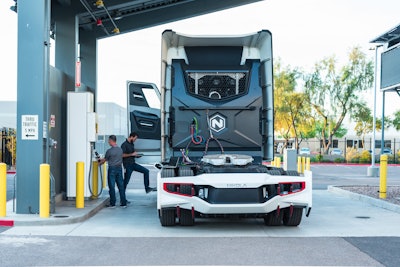 Nikola supplier Nel, the largest electrolyzer manufacturer in the world, is based in Norway. “The way we see the cost of electrolyzers coming down, the way we see the costs of renewables coming down—even this year we are in the middle of a COVID-19 crisis, even this year we will see 150 gigawatt of solar being installed,” Nel CEO Jon Andre Lokke said during a June webinar hosted by the International Partnership for Hydrogen and Fuel Cells in the Economy.
Nikola supplier Nel, the largest electrolyzer manufacturer in the world, is based in Norway. “The way we see the cost of electrolyzers coming down, the way we see the costs of renewables coming down—even this year we are in the middle of a COVID-19 crisis, even this year we will see 150 gigawatt of solar being installed,” Nel CEO Jon Andre Lokke said during a June webinar hosted by the International Partnership for Hydrogen and Fuel Cells in the Economy.“There are over 33,000 hydrogen fuel cell forklifts in the market. This is a good DOE success story that we funded over 10 years ago with very early R&D, eventual demonstrations and now over 20 million fuelings,” Satyapal said.
“In fact, every few seconds, some customer is fueling with hydrogen,” she continued. “Within distribution in warehouses where they need zero emissions and it’s more time-consuming to charge a battery, it’s becoming economically viable. So again, major companies—Walmart, Amazon—are putting in fuel cell forklifts. In terms of safety, including the storage tanks, I don’t think that’s an issue any longer. It’s more of a perception from the past.”
As with other modes of transportation, Nikola founder and Executive Chairman Trevor Milton said safety is key in fuel cell development.
“Everything has its danger. Everything’s a little bit difficult. Everything’s going to eventually hurt someone, unfortunately,” Milton said. “That’s just a fact of life. Airplanes crash. Electric cars burn down and kill people. Hydrogen vehicles have had accidents. It’s part of life and it’s part of engineering and it’s our obligation to make sure we’re testing it as well as it can be tested for safety of the people driving it. You have to educate people and I think once you start seeing these on the road, the fear goes away. That’s the key. Get them on the road and the fear goes away.”
Liquified hydrogen fill times are faster than a 15-minute fill-up from gaseous hydrogen, Milton said, but would require “someone who’s trained in it and that would probably take five or ten minutes and you’re out. That’s the advantage of hydrogen. You can turn it really fast, really easy and you can go very long distances and you can weigh ten thousand pounds lighter than a battery electric truck.”
A comparable electric semi, which Nikola also plans to produce, will weigh about 10,000 additional pounds over its fuel cell model because of the large battery pack required to enable productive range. Nikola’s fuel cell trucks are being developed for long-haul highway use while their electric trucks are being designed for the “city where you’re only driving it throughout one day. That’s where battery is really good,” Milton said.
In addition to fuel cell R&D, Cummins has also been developing all-electric powertrains and according to its website it’s taken the position that more demanding duty cycles, like long-haul trucking, are not suited to battery electric vehicles because “maximum allowable axle weights constrain the number of battery packs that can be installed before compromising road weight limits and payload capacity.”
It’s a point that Cummins CEO Tom Linebarger drove home during a webinar in June hosted by The International Partnership for Hydrogen and Fuel Cells in the Economy.
“Every investor recognizes that public companies have made commitments to be zero-net emission by 2050,” Linebarger told fellow panelists. “And if that’s the case there really isn’t a transportation solution that will work at least not for large scale energy projects, like trains and things like it, other than hydrogen. The truth is most people do not see batteries as the final solution for the large energy user. So increasingly investors are understanding that hydrogen is really the best path forward.”
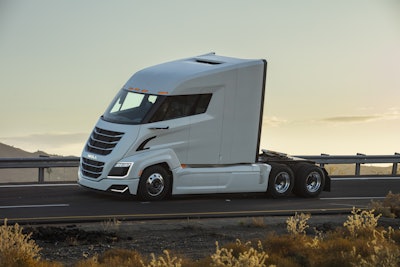 Nikola Two shown above. “We have fuel cells lasting between 10,000 and 20,000 thousand hours without rebuilds and that’s never been achievable in the past. It’s ready for prime time now,” Nikola founder and Executive Chairman Trevor Milton said of the Bosch fuel cells used in his company’s trucks.
Nikola Two shown above. “We have fuel cells lasting between 10,000 and 20,000 thousand hours without rebuilds and that’s never been achievable in the past. It’s ready for prime time now,” Nikola founder and Executive Chairman Trevor Milton said of the Bosch fuel cells used in his company’s trucks.Musk has also criticized hydrogen production through electrolysis as being extremely inefficient. He said after hydrogen is extracted from water and compressed, the process becomes about half as efficient compared to using that same solar energy to power batteries. Milton counters that argument by saying that the key to efficiency in electrolysis is by using large electrolyzers powered by renewable energy which for Nikola has gotten hydrogen fuel costs down to nearly $2.50 per kilogram making the fuel “cheaper than diesel to operate.”
The renewable aspects of hydrogen fuel production make it appealing versus the finite supplies of electric-vehicle battery elements such as lithium, cobalt and nickel. Battery recycling, following second-life use application, is also limited, with the world’s largest EV manufacturer, China-based BYD, reporting a 40 to 60% recovery rate for cobalt alone with the rest resulting in highly toxic sludge.
In the last few years, China has stepped up fuel cell research and production. Beijing alone plans to add 1,000 H2 stations and “have one million FCVs on the road by 2030,” according to asia.nikkei.com.
Growing competition around the globe further fuels Linebarger, Milton and others to keep promoting and pursuing their fuel cell goals even as vocal, all-electric champions like Musk keep criticizing their efforts.
“I think the most important thing is that we need to begin to build regional scale centers where we can begin to deploy these technologies in a serious way,” Linebarger said. “Deployment for storage, renewable storage, deployment for transportation and deployment for industry. I think Southern California is a good example but we need more of those places in more parts of the world. We don’t want just spot solutions. We need regional areas where all the technologies are deployed, we can all come down to scale, investors can make money and then we can go to the next spot. And I think whoever does it, the next one will do it and we all benefit.”
Previously in this series: Hydrogen-powered Class 8 rigs: How fuel cell trucks produce electric power and how they’re fueled


